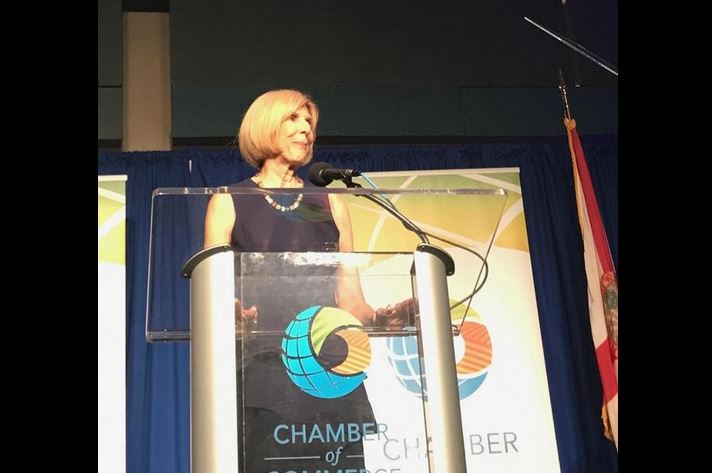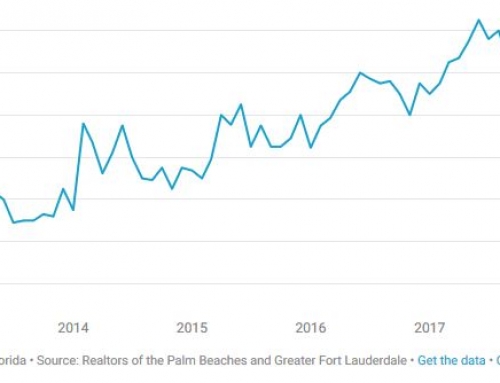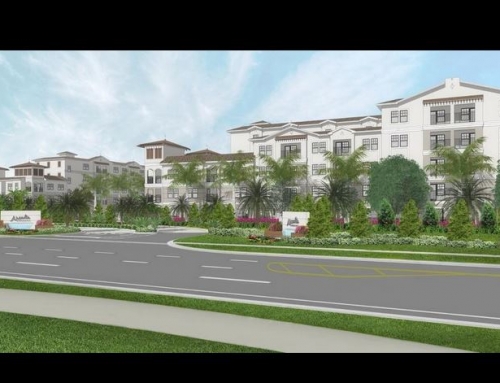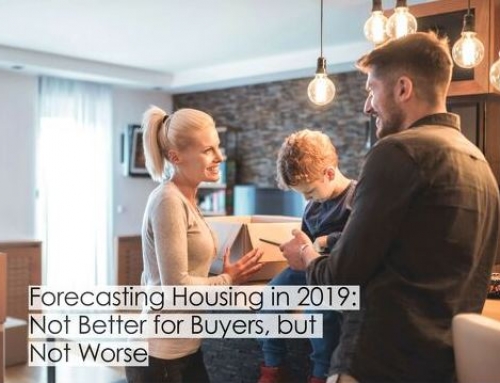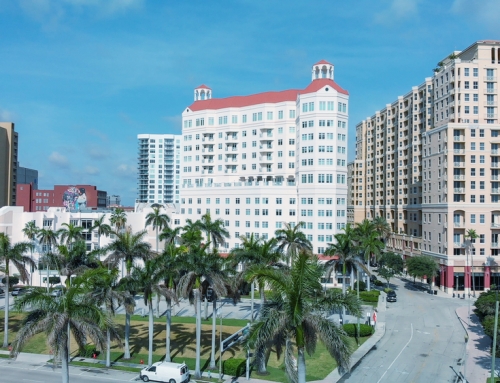In her final State of the City (West Palm Beach) address, Mayor Jeri Muoio decreed “The state of the city, our city, is good, very good.” While you may or may not agree, the city has made incredible progress in the eight years since the Mayor took office in 2011—at the height of the recession and with many huge problems, no money, high crime rates, unemployment and a broken, aging infrastructure. Mayor Muoio states that West Palm Beach is positioned as the city of the future
CREDITS:
By Tony Doris
Published in the Palm Beach Post | Jan 24, 2019
WEST PALM BEACH — When she took office in 2011, the city was reeling from recession, trimming payroll and services and seeing its role as, “very simply, to keep the lights on.”
Eight years later, in her final State of the City Address on Thursday morning, Mayor Jeri Muoio said West Palm Beach’s “reputation as a world-class city is on the rise.”
In a speech before several hundred at the Palm Beach County Convention Center, she pointed to her efforts to improve the city economy and its natural and urban environments and to reorganize for greater efficiency.
The unemployment and crime rates are down and the city has positioned itself to attract employers and visitors, by encouraging office construction and improved transportation options, while also focusing on downtown livability and energy sustainability, she said.
The city has work ahead of it on poverty and homelessness, she said, calling on the county, state and federal governments to pitch in to create affordable housing and address mental health needs that contribute to the problems. The term-limited mayor challenged her successor — the mayoral election is March 12 — to continue her anti-poverty initiatives for “a safe and health community.
WEST PALM BEACH — When she took office in 2011, the city was reeling from recession, trimming payroll and services and seeing its role as, “very simply, to keep the lights on.”
Eight years later, in her final State of the City Address on Thursday morning, Mayor Jeri Muoio said West Palm Beach’s “reputation as a world-class city is on the rise.”
In a speech before several hundred at the Palm Beach County Convention Center, she pointed to her efforts to improve the city economy and its natural and urban environments and to reorganize for greater efficiency.
The unemployment and crime rates are down and the city has positioned itself to attract employers and visitors, by encouraging office construction and improved transportation options, while also focusing on downtown livability and energy sustainability, she said.
The city has work ahead of it on poverty and homelessness, she said, calling on the county, state and federal governments to pitch in to create affordable housing and address mental health needs that contribute to the problems. The term-limited mayor challenged her successor — the mayoral election is March 12 — to continue her anti-poverty initiatives for “a safe and health community.
The mayor, who turns 71 on Valentine’s Day, told a receptive audience of community leaders at the chamber of commerce breakfast that she now “wants to take the West Palm Beach story to the rest of America, to show what’s possible when people pull together, dare to dream, and have the courage to make their dreams a reality.”
Highlights of the speech:
-
- The city’s unemployment rate has dropped from 9.1 percent when Muoio took office to 3 percent, nearly a point lower than the national average. Jobs have grown by 20 percent, more than double the national average.
-
- The city designated a Flagler Financial District, as “a destination for finance,” with a cluster of nearly 250 financial service firms.
-
- The city pushed through an Okeechobee Business District, an area designated to encourage Class-A office construction.
-
- West Palm gained an outlet mall that 4 million people visited last year, a Major League spring training facility and a Brightline express rail station; designated a trendy Warehouse District; and saw construction of Bristol Tower, an ultra-luxury condo that will add $659 million worth of real estate to the tax base.
- The city focused on sustainability and energy efficiency, setting goals to convert its vehicle fleet to non-fossil fuel by 2025 and to eliminate carbon emissions by 2050.
WEST PALM BEACH — When she took office in 2011, the city was reeling from recession, trimming payroll and services and seeing its role as, “very simply, to keep the lights on.”
Eight years later, in her final State of the City Address on Thursday morning, Mayor Jeri Muoio said West Palm Beach’s “reputation as a world-class city is on the rise.”
In a speech before several hundred at the Palm Beach County Convention Center, she pointed to her efforts to improve the city economy and its natural and urban environments and to reorganize for greater efficiency.
The unemployment and crime rates are down and the city has positioned itself to attract employers and visitors, by encouraging office construction and improved transportation options, while also focusing on downtown livability and energy sustainability, she said.
The city has work ahead of it on poverty and homelessness, she said, calling on the county, state and federal governments to pitch in to create affordable housing and address mental health needs that contribute to the problems. The term-limited mayor challenged her successor — the mayoral election is March 12 — to continue her anti-poverty initiatives for “a safe and health community.
The mayor, who turns 71 on Valentine’s Day, told a receptive audience of community leaders at the chamber of commerce breakfast that she now “wants to take the West Palm Beach story to the rest of America, to show what’s possible when people pull together, dare to dream, and have the courage to make their dreams a reality.”
Highlights of the speech:
-
- The city’s unemployment rate has dropped from 9.1 percent when Muoio took office to 3 percent, nearly a point lower than the national average. Jobs have grown by 20 percent, more than double the national average.
-
- The city designated a Flagler Financial District, as “a destination for finance,” with a cluster of nearly 250 financial service firms.
-
- The city pushed through an Okeechobee Business District, an area designated to encourage Class-A office construction.
-
- West Palm gained an outlet mall that 4 million people visited last year, a Major League spring training facility and a Brightline express rail station; designated a trendy Warehouse District; and saw construction of Bristol Tower, an ultra-luxury condo that will add $659 million worth of real estate to the tax base.
-
- The city focused on sustainability and energy efficiency, setting goals to convert its vehicle fleet to non-fossil fuel by 2025 and to eliminate carbon emissions by 2050.
The city is on its way to spending $1 million on shade trees to make streets more walkable.
“In the last couple years,” she said, “we focused on making West Palm Beach a vibrant city — a city where people want to be, want to live, want to work and want to be a part of. To that end, we’ve made quality of life, public spaces, walkability and transit all top priorities,” she said.
She tipped her hat to a coming expansion of trolley routes, bike lanes and bike-share facilities, also crediting the Art in Public Places program, and creation of an Office of Public Life, “to make public spaces one of the hallmarks of West Palm Beach life.”
A new water treatment plant about to go online and the continued battle to prevent the expansion of State Road 7 next to the city’s Grassy Waters Preserve are safeguarding West Palm’s water supply, Muoio said.
While the overall crime rate is at a 20-year-low, and Real Time Crime Center and ShotSpotter technology promise further improvement, “we must do more to address the root causes of violent crime,” she said. The city poverty rate stands at 17 percent — hard to understand considering the low unemployment, she noted.
She urged business leaders to hire youths, ex-felons and the homeless. The city this year budgeted more than $4 million to help the homeless, through nonprofit Vickers House’s operations, supportive housing, a full-time Street Engagement Team and other programs, she said.
She urged business leaders to hire youths, ex-felons and the homeless. The city this year budgeted more than $4 million to help the homeless, through nonprofit Vickers House’s operations, supportive housing, a full-time Street Engagement Team and other programs, she said.
“But, as a society, we must ask ourselves — and our partners at the county, state and federal levels — questions that we haven’t fully answered: Are we doing enough to create affordable housing or shelter? And are we doing enough to address the mental and behavioral health issues that so often factor into homelessness?”
But overall, the departing mayor sounded an upbeat, hopeful note: “The state of the city, our city, is good, very good,” she said.


